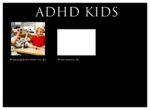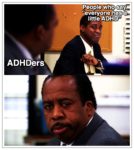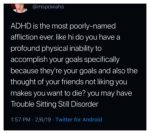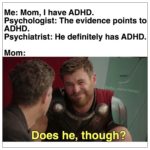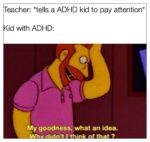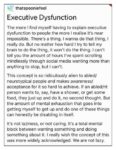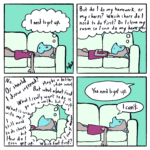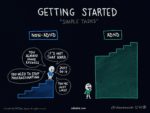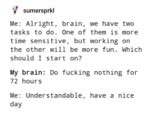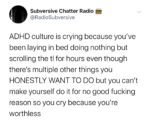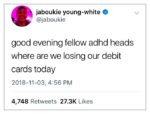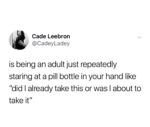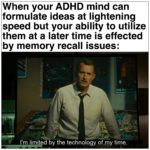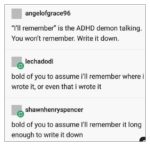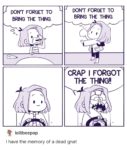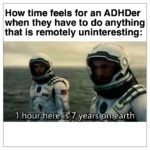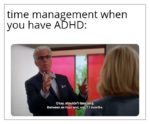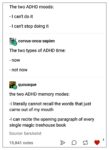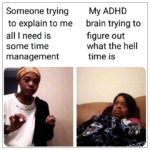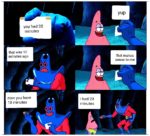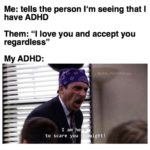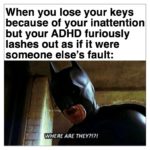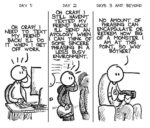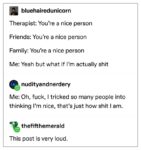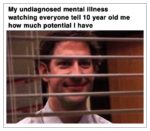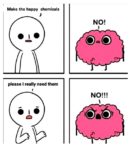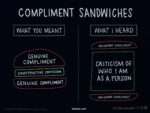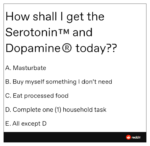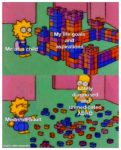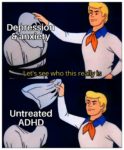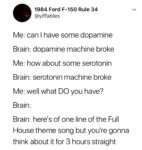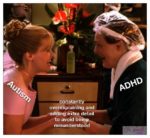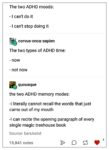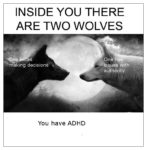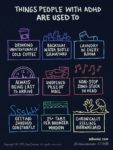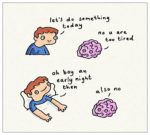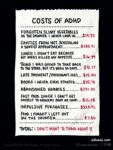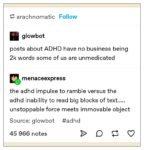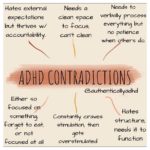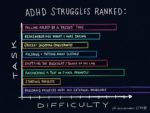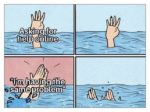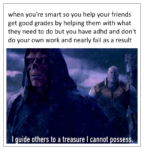Neurodiversity
Articles about interesting research, personal experiences, and societal acceptance of ASD, ADHD, etc.
No two people are the same; you are encouraged to customize this document to your own needs, abilities, and resources.
Copyright Sinope (eponis.tumblr.com), 2015. This work is licensed under a Creative Commons Attribution 4.0 International License.
Questions to ask before giving up
Are you hydrated?
If not, have a glass of water.
Have you eaten in the past three hours?
If not, get some food — something with protein, not just simple carbs. Perhaps some nuts or hummus? Maybe a piece of cheese?
Have you showered in the past day?
If not, take a shower right now.
Have you stretched your legs in the past day?
If not, do so right now. If you don’t have the energy for a run or trip to the gym, just walk around the block, then keep walking as long as you please. If the weather’s crap, drive to a big box store (e.g. Target) and go on a brisk walk through the aisles you normally skip. Alternatively, do some squats till you feel it.
Have you said something nice to someone in the past day?
Do so, whether online or in person. Make it genuine; wait until you see something really wonderful about someone, and tell them about it.
Have you moved your body to music in the past day?
If not, jog for the length of an EDM song at your favorite tempo, or just dance around the room for the length of an upbeat song.
Have you cuddled a living being in the past two days?
If not, do so. Don’t be afraid to ask for hugs from friends or friends’ pets. Most of them will enjoy the cuddles too; you’re not imposing on them.
Have you seen a therapist in the past few days?
If not, hang on until your next therapy visit and talk through things then.
Have you changed any of your medications in the past couple of weeks, including skipped doses or a change in a generic prescription brand?
That may be screwing with your head… and also your body. Give things a few days, then talk to your doctor if it doesn’t settle down.
If daytime: are you dressed?
If not, put on clean clothes that aren’t pajamas. Put on your shoes, and ready yourself as if you were going outside. Give yourself permission to wear something special, whether it’s a funny t-shirt or a pretty dress.
If nighttime: are you sleepy and fatigued but resisting going to sleep?
Put on pajamas, make yourself cozy in bed with a teddy bear and the sound of falling rain, and close your eyes for fifteen minutes — no electronic screens allowed. If you’re still awake after that, you can get up again; no pressure.
Do you feel ineffective?
Pause right now and get something small completed, whether it’s responding to an e-mail, loading up the dishwasher, or packing your gym bag for your next trip. Good job!
Do you feel unattractive?
Take a goddamn selfie. Your friends will remind you how great you look, and you’ll help fight society’s restrictions on what beauty can look like.
Do you feel paralyzed by indecision?
Give yourself ten minutes to sit back and figure out a game plan for the day. If a particular decision or problem is still being a roadblock, simply set it aside for now, and pick something else that seems doable. Right now, the important part is to break through that stasis, even if it means doing something trivial.
Have you over-exerted yourself lately — physically, emotionally, socially, or intellectually?
That can take a toll that lingers for days. Give yourself a break in that area, whether it’s physical rest, taking time alone, or relaxing with some silly entertainment.
Have you waited a week?
Sometimes our perception of life is skewed, and we can’t even tell that we’re not thinking clearly, and there’s no obvious external cause. It happens. Keep yourself going for a full week, whatever it takes, and see if you still feel the same way then.
You’ve made it this far, and you will make it through. You are stronger than you think.
Why stress hormones and fight or flight response are part of ADHD “Teaching”
Here’s something that happens to ADHD children a lot: Getting pushed beyond their limits by accident. Here’s how it works and why it’s so bad.
The child says, “I can’t do this.” Adult (teacher or parent) does not believe it, because Adult has seen Child do things that Adult considers more difficult, and Child is too young to properly articulate why the task is difficult.
Adult decides that the problem is something other than true inabilities, like laziness, lack of self-confidence, stubbornness, or lack of motivation.
Adult applies motivation in the form of harsher and harsher scoldings and punishments. The child becomes horribly distressed by these punishments. Finally, the negative emotions produce a wave of adrenaline that temporarily repairs the neurotransmitter deficits caused by ADHD, and the Child manages to do the task, nearly dropping from relief when it’s finally done.
The lesson the Adult takes away is that Child was able to do it all along, the task was quite reasonable, and Child just wasn’t trying hard enough. Now, surely Child has mastered the task and learned the value of simply following instructions the first time.
The lessons Child takes away? Well, it varies, but it might be:
- How to do the task while in a state of extreme panic, which does NOT easily translate into doing the task when calm.
- Using emergency fight-or-flight overdrive to deal with normal daily problems is reasonable and even expected.
- It’s not acceptable to refuse tasks, no matter how difficult or potentially harmful.
- Asking for help does not result in getting useful help.
…………..
Not mine, source:
(Part of the foundation for a case I’m making about biological foundations of ADHD. The “Parkinsonian personality” is well known and the opposite of classic ADHD. ADHD is strongly linked with much higher than normal numbers of dopamine transfer neurons in specific parts of the brain and Parkinson’s disease is directly connected to the death of these neurons.)
The Parkinsonian Personality: More Than Just a “Trait”
Since 1913 patients with Parkinson’s disease (PD) have been described as particularly industrious, devoted to hard work, inflexible, punctual, cautious, and moralist (1). These psychological characteristics have been so constantly reported that the concept of “Parkinsonian personality” emerged. In this regards, in the last few years PD patients have been evaluated according to several models of personality assessment (2), with the Big Five Model (BFM) (3) and the Cloninger’s Psychobiological Model (CPM) (4) as the most used. Studies following the BFM reported that PD patients presented high levels of Neuroticism and low levels of both Openness and Extraversion (5, 6), while studies using the CPM described the temperament of PD patients as characterized by low Novelty Seeking (NS) and high Harm Avoidance (HA) (2, 7, 8). As a matter of fact, the high HA could be responsible for the Parkinsonians’ tendency to be cautious, fearful, pessimistic and shy, while the low levels of NS could account for the tendency to be unsocial, frugal and orderly. Under different points of view, the “Parkinsonian personality,” as it has been consistently reported in literature (7, 9), shares several clinical features with the obsessive-compulsive personality disorder (OCPeD) as classified in the Diagnostic and Statistical Manual for Mental Disorders (DSM) (10).
The OCPeD is defined as a “chronic, pervasive, maladaptive pattern of preoccupation with orderliness, perfectionism, mental and interpersonal control at the expense of flexibility, openness, and efficiency” (10). In the general population, it is the most common personality disorder with a lifetime prevalence reaching the 9.3% (11). Classically considered as stable over time, an increasing number of observations allow to hypothesize that the clinical presentation of OCPeD is less stable than originally assumed, being possible to detect the occurrence, attenuation, or relapse of obsessive symptoms across the life-time (12, 13). While the correspondence between the presence of high HA and low NS levels and OCPeD has been investigated in the general population over the years (14–16), no studies on the correspondence between these temperament traits, configuring the parkinsonian personality, and OCPeD have been conducted in PD patients.
Original article:
Psycho comes from the Greek word psykho, which means mental. The Greek root word path can mean either “feeling” or “disease.” So psychopath is a word meaning “mental illness”. “Sociopath” is not a clinical term and it is a no-no for mental health professionals to use it. However, I am NOT a mental health professional, and the name is rather on point about the issue: Sick towards society, towards people. In the 1830’s this disorder was called “moral insanity.” By 1900 it was changed to “psychopathic personality.” More recently it has been termed “antisocial personality disorder” in the DSM-III and DSM-IV.
DSM-IV Definition: Antisocial personality disorder is characterized by a lack of regard for the moral or legal standards in the local culture. There is a marked inability to get along with others or abide by societal rules.
It’s easy to take the DSM on faith at face value as sufficient authority to settle the issue of who is or isn’t thoroughly, but the needs of the mental health community and others who have to deal with psychopaths don’t line up perfectly. The DSM criteria depend heavily on observed behaviors while law enforcement and criminal justice must often predict behavior based on personality characteristics. Continue reading
(Not my writing, preserving author anonymity)
I have ADHD. My dad has ADHD.
I know that it’s hard for NT folks to understand what it’s like to have ADHD, but you HAVE to stop connecting moral judgment to our ability or inability to do things.
We would not be on time if we just loved you more. We would not remember our appointments of we just tried harder. Our brains are not a good fit for this neurotypical world.
Assistive methods and devices are not there to train us to have a habit when they’re gone. Assistive methods are what allow us to maintain these habits.
If we grow out of one method it’s just because we’ve replaced it with another. Ideally, the method would be housed in our brain (yay medicine! or meditation! or positive self-talk! or any sorts of other internal practices!) but it’s still there. Continue reading
I didn’t write this, I lived it. All I would add is that for most of these, the word ‘child’ could just as well be; friend, sibling, partner, employee. Credit to the anonymous author.
- I’m trying way harder than you’ll ever know even though it doesn’t seem like it to you. I really, truly am.
- Criticizing me or getting angry at me that my brain doesn’t work better doesn’t help me. It makes me hate myself even more.
- I’m painfully aware of all the areas that I’m not measuring up. Instead of making a big deal about my shortcomings, try to find ways to help me.
- An accommodation isn’t the same as enabling. If you help me where I’m genuinely struggling, I’m going to be grateful. Don’t assume that I’m manipulating you.
- I’m not doing this to you, it’s NOT something I am doing on purpose.
- If you think it’s hard to live with me, imagine trying to live inside a body that won’t do what you want it to do.
- My brain doesn’t work right but I don’t know how to tell you that. It makes me angry and unkind, but I’m not trying to be that way.
- When I’m being horrible, what I really need is for you to tell me you’ll love me no matter what. And maybe hug me, too. I probably believe that I’m unlovable, so prove me wrong.
- I know that my lack of motivation is frustrating, but pushing harder doesn’t help me do better.
- My anger and frustration is a result of my brain not processing properly. When I’m overwhelmed and freaking out, don’t escalate by freaking out or getting angry too. I need you to be calm and show me that everything’s going to be fine even when I feel like it’s not.
- If I get overwhelmed, don’t expect me to sort out the problem all by myself. The part of my brain that controls regulation doesn’t work properly. That’s why I need your help to regulate.
- Don’t try to break me of things that you see as weaknesses. My sensitivity as a child means I’ll be compassionate as an adult. My stubbornness as a child means I’ll be independent and assertive as an adult. Instead of squashing these characteristics, channel them toward something good that can benefit me when I’m older. Don’t view me as something that needs fixed or toughened up.
- Don’t be afraid of labeling me. A label gives me answers and help. If my condition is serious enough to need to be diagnosed, you can guarantee that I’ve noticed something’s wrong and I’m wondering why I’m different too. Unless you tell me what’s going on, I’m likely to grow up angry and confused about why everyone has it all together and I don’t. A label means I can get help, it gives me answers and vindication.
- I have a real, actual medical condition in my brain. It’s just as real as if I had Type 1 Diabetes. Just like Diabetes, I need help to deal with the condition. No one tells someone with Type 1 Diabetes that they are lazy if they’re tired because their blood sugar is low. They understand that it’s part of the condition.
- Please, please, please learn about my condition, and don’t blame me for things that are out of my control. Just like leaving Type 1 Diabetes untreated results in serious complications and even death, untreated ADHD can lead to serious complications – potentially including death. Thankfully, there are many ways to treat ADHD (and medication isn’t the only way but a sure way to help me).
- My frontal lobe is developing 30% behind normal. Please understand this and don’t put me in situations I’m not ready to handle. If you give me responsibility that’s beyond my developmental age, don’t be angry with me that I do poorly. That’s setting me up for failure, and that’s just cruel.
- Stop expecting me to be normal. I can’t be. Not for all my trying. Until you accept that, I’ll always be a failure in your eyes, and I’ll always view myself as not good enough.
- You have the power to make me miserable by how you treat me. Remember to treat me with love and grace. Treat me how you would want to be treated if you were struggling with a problem in your brain. I may make myself miserable sometimes, but don’t add to that by treating me poorly. When in doubt, be kind. Believe me, I need your kindness, love, support, time and validation.
Nobody Understands (but they all think they do)
Executive Dysfunction, motivation, avoidance, resistance, disorganization
Memory: Short term, long term, working, and nonexistent
Time Blindness, distortion
Emotional Mess: Rejection sensitive dysphoria, anxiety, depression, guilt, shame, despair, etc.
Random leftovers
Knowing Things We Never Learned:
Nearly all of us must struggle diligently to acquire even modest talent in Mathematics, Music, and Art. We encounter genius as a rare group of people who display an amazing gift that seems to come to them easily compared to our sweaty, grinding, display. People with this kind of talent are sometimes called savants. Below them are random individuals of great talent and below them, the rest of us in a bell curve spread from mediocre to hopeless. Yet effortless, genius-level mastery of these areas appears to be latent in our brains, modularized in you and me, right now. How to back up such a claim? We learn much about ourselves through the exceptions of pathology and extreme variation. A break in the pattern reveals the pattern.
There are three kinds of savants that reveal these “genius modules”. Continue reading
“The Brain tunes itself to criticality, maximizing information processing”
Our brains are clearly amazing at processing the “blooming, buzzing1” world around us. A recent experiment supports the theory that when neurons work together they actively cooperate to achieve their maximum processing capacity. They seek the urgent, intense edge of their ability. Picture them as the human runners in an Amazon “fulfillment center” except happy in their work.
The entire brain appears to seek this set point or default working state at the maximum of its abilities: “Where it is as excitable as it can be, without tipping into disorder, similar to a phase transition.” A phase transition is where matter transitions from one state, liquid, solid, or gaseous, to a different state.
In other words, our brains are balanced about one millimeter from chaos and disorder. That’s all of us, all the time. Returning from sleep or other off duty moments the brain tunes and retunes itself seeking this point.
While the study neither reveals nor claims anything else about our neurology, I think it points a bright red arrow at possible organic causes of ADHD (as well as ASD, schizophrenia, etc). If the default human phenome, the standard, mass-produced person has this edge-of-chaos set-point, then genetic variation (known to be the prime cause of ADHD) could easily generate a different set point. This variation might generate the quirky, out of step processing that makes us so valuable in the modern workforce, wait, strike that…
It also seems logical that anything that alters this point results in behavioral instability.
More and other interesting details in the reports:
1 William James, writing about sensory processing. : “The baby, assailèd by eyes, ears, nose, skin, and entrails at once, feels it all as one great blooming, buzzing confusion; “
This artist ( pina@adhd-alien.com ) does the best job I have ever seen of communicating what ADHD really is, and is like. We baffle and disappoint ourselves and the people and structures we need in our lives. Every hour of the day is a neurological roulette wheel. Here’s a link to her site.
I would be grateful to anyone who casually imagines they know what ADHD is like, to read several of these. I would simply like as many people as possible to better understand this disorder. It’s weirder and more limiting than you think.
It’s WAY more than inattention, and let me tell you, it isn’t lack of effort. We are 11% of the population and stories of effective treatment have been greatly exaggerated. The person in these cartoons is ON her meds.
Friends, family, and even total strangers confidently inform us that our problem isn’t real. Everybody thinks they get it, and even professionals in education and mental health often lazily ASSUME they get it with no research since 1993.
It’s like mental multiple sclerosis but we just look like we’re ditzy, and not trying hard enough.
